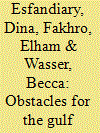|
|
|
Sort Order |
|
|
|
Items / Page
|
|
|
|
|
|
|
| Srl | Item |
| 1 |
ID:
154361


|
|
|
|
|
| Summary/Abstract |
The Islamic State in Iraq and Syria (ISIS)'s activities now go beyond insurgency and conventional operations in the territories it controls in the Middle East. It poses a threat to U.S. interests and allies in Europe, and a serious threat to Iran and its borders. While Washington formed an international coalition encompassing many European and Middle Eastern states to combat ISIS, it only coordinates some tactical and operation-level efforts with a key player on the ground: Iran. For its part, Iran is leveraging similar counter-ISIS tools as those adopted by the United States, despite their strategies differing fundamentally.
|
|
|
|
|
|
|
|
|
|
|
|
|
|
|
|
| 2 |
ID:
156278


|
|
|
| 3 |
ID:
127556


|
|
|
|
|
| Publication |
2014.
|
| Summary/Abstract |
No substantive progress has been made toward the creation of a Middle Eastern zone free of weapons of mass destruction (WMD).The only way to change this is by adopting an incremental approach to the zone:phasing weapons out by category, beginning with chemical weapons.
|
|
|
|
|
|
|
|
|
|
|
|
|
|
|
|
| 4 |
ID:
150285


|
|
|
|
|
| Summary/Abstract |
It was President Barack Obama’s 2009 Prague speech that set the tone for his utopian vision of a world without nuclear weapons. As part of this vision, he sought to ensure that Iran would not go nuclear. Obama also set diplomacy and dialogue as his administration’s main foreign policy tools. With the 2015 Iran nuclear deal, he accomplished both aims. Today, the Joint Comprehensive Plan of Action curbs Iran’s nuclear program and prevents it from dashing for the bomb. In his Prague speech, Obama declared that his administration would use dialogue “based on mutual interests and mutual respect” to prevent a nuclear-armed Iran. The 2010 U.S. Nuclear Posture Review reiterated that bolstering the global nuclear nonproliferation regime and curbing Iran’s nuclear ambitions were at the top of his administration’s agenda.
|
|
|
|
|
|
|
|
|
|
|
|
|
|
|
|
| 5 |
ID:
138334


|
|
|
|
|
| Summary/Abstract |
This article assesses Iran's strategy in dealing with the threat of the Islamic State in Iraq and Syria (ISIS). It examines the implications of the rise of ISIS in Iran's immediate neighbourhood for Tehran's policies in Syria and Iraq and investigates how each of these countries affects Iranian national interests. It provides an overview of the major events marking Iran and Iraq's relations in the past few decades and discusses the strategic importance of Iraq for Iran, by looking at the two countries' energy, economic and religious ties. It also considers Iran's involvement in Syria since the beginning of the Syrian conflict. The article sheds light on the unilateral action taken by Tehran to counter ISIS, the adjustments it may have to make to its involvement in Syria, and the potential areas for tactical cooperation between Iran and the United States, as well as other key regional states such as Saudi Arabia. The article investigates three likely scenarios affecting the developments in Iraq and Iran's possible response to them as the events in the Middle East unfold.
|
|
|
|
|
|
|
|
|
|
|
|
|
|
|
|
| 6 |
ID:
107378


|
|
|
|
|
| Publication |
2011.
|
| Summary/Abstract |
Judging by their official statements, the establishment of a zone free of weapons of mass destruction (WMD) in the Middle East ranks high on the list of policy priorities of the six member states of the Gulf Cooperation Council (GCC)-Bahrain, Kuwait, Oman, Qatar, Saudi Arabia, and the United Arab Emirates (UAE).[1] As countries bordering a once-proliferating, aggressive state (Iraq); facing another suspected of seeking a nuclear weapons capability and bent on regional hegemony (Iran); and living in the vicinity of nuclear powers outside the nuclear Nonproliferation Treaty (NPT) regime (India, Israel, and Pakistan), they arguably have a paramount security interest in its rapid formation.
|
|
|
|
|
|
|
|
|
|
|
|
|
|
|
|
| 7 |
ID:
147227


|
|
|
|
|
| Summary/Abstract |
When the Houthi rebels took control of Yemen's capital, Sanaa, in September 2014, Arab Gulf officials and Western pundits claimed that Iran was aiming to export its revolutionary ideology and establish a Shia empire throughout the Middle East.11. Ali Mamouri, “Leaked Cables Show Gulf Leery of Shiite Expansion,” Al-Monitor, June 26, 2015, http://www.al-monitor.com/pulse/originals/2015/06/gulf-fears-shiite-expansion-wikileaks-saudi-arabia-iran.html.View all notes They claimed that Iran was doing so by backing, perhaps even controlling, the Shia Houthis. The Houthi takeover came at a critical point for the region: Tehran was in the midst of negotiations to resolve the crisis surrounding its nuclear program. The resulting deal provided Tehran with sanctions relief and removed some of the barriers to Iran's reintegration into the international community. Some already wary Gulf Arab states viewed the success of the talks as an end to Iranian isolation, with the country fixing its broken ties to the West and reasserting itself as a top regional power.
|
|
|
|
|
|
|
|
|
|
|
|
|
|
|
|
|
|
|
|
|